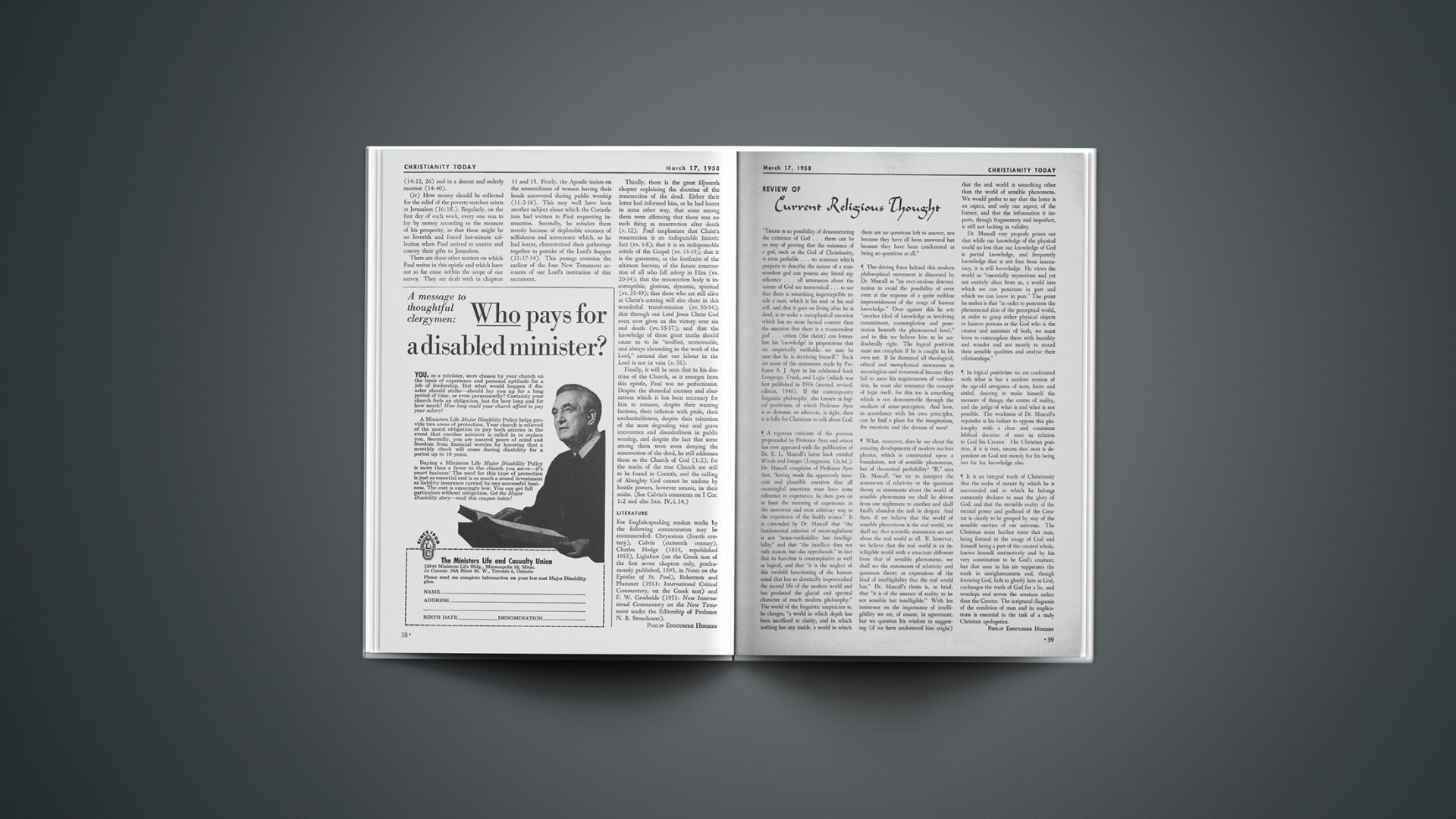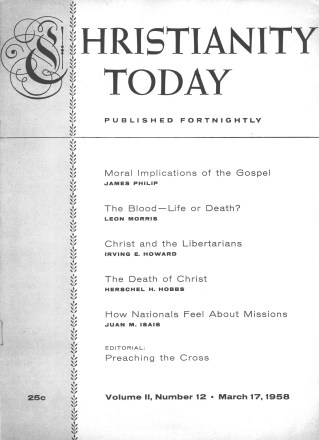“There is no possibility of demonstrating the existence of God … there can be no way of proving that the existence of a god, such as the God of Christianity, is even probable … no sentence which purports to describe the nature of a transcendent god can possess any literal significance … all utterances about the nature of God are nonsensical … to say that there is something imperceptible inside a man, which is his soul or his real self, and that it goes on living after he is dead, is to make a metaphysical assertion which has no more factual content than the assertion that there is a transcendent god … unless (the theist) can formulate his ‘knowledge’ in propositions that are empirically verifiable, we may be sure that he is deceiving himself.” Such are some of the statements made by Professor A. J. Ayer in his celebrated book Language, Truth, and Logic (which was first published in 1936 (second, revised, edition, 1946). If the contemporary linguistic philosophy, also known as logical positivism, of which Professor Ayer is so dynamic an advocate, is right, then it is folly for Christians to talk about God.
A vigorous criticism of the position propounded by Professor Ayer and others has now appeared with the publication of Dr. E. L. Mascall’s latest book entitled Words and Images (Longmans, 12s.6d.). Dr. Mascall complains of Professor Ayer that, “having made the apparently innocent and plausible assertion that all meaningful assertions must have some reference to experience, he then goes on to limit the meaning of experience in the narrowest and most arbitrary way to the experience of the bodily senses.” It is contended by Dr. Mascall that “the fundamental criterion of meaningfulness is not “sense-verifiability but intelligibility” and that “the intellect does not only reason, but also apprehends,” in fact that its function is contemplative as well as logical, and that “it is the neglect of this twofold functioning of the human mind that has so drastically impoverished the mental life of the modern world and has produced the glacial and spectral character of much modern philosophy.” The world of the linguistic empiricists is, he charges, “a world in which depth has been sacrificed to clarity, and in which nothing has any inside, a world in which there are no questions left to answer, not because they have all been answered but because they have been condemned as being no questions at all.”
The driving force behind this modern philosophical movement is discerned by Dr. Mascall as “an over-anxious determination to avoid the possibility of error even at the expense of a quite ruthless impoverishment of the range of human knowledge.” Over against this he sets “another ideal of knowledge as involving commitment, contemplation and penetration beneath the phenomenal level,” and in this we believe him to be undoubtedly right. The logical positivist must not complain if he is caught in his own net. If he dismissed all theological, ethical and metaphysical statements as meaningless and nonsensical because they fail to meet his requirements of verification, he must also renounce the concept of logic itself, for this too is something which is not demonstrable through the medium of sense-perception. And how, in accordance with his own principles, can he find a place for the imagination, the emotions and the dreams of men?
What, moreover, does he say about the amazing developments of modern nuclear physics, which is constructed upon a foundation, not of sensible phenomena, but of theoretical probability? “If,” says Dr. Mascall, “we try to interpret the statements of relativity or the quantum theory as statements about the world of sensible phenomena we shall be driven from one nightmare to another and shall finally abandon the task in despair. And then, if we believe that the world of sensible phenomena is the real world, we shall say that scientific statements are not about the real world at all. If, however, we believe that the real world is an intelligible world with a structure different from that of sensible phenomena, we shall see the statements of relativity and quantum theory as expressions of the kind of intelligibility that the real world has.” Dr. Mascall’s thesis is, in brief, that “it is of the essence of reality to be not sensible but intelligible.” With his insistence on the importance of intelligibility we are, of course, in agreement; but we question his wisdom in suggesting (if we have understood him aright) that the real world is something other than the world of sensible phenomena. We would prefer to say that the latter is an aspect, and only one aspect, of the former, and that the information it imparts, though fragmentary and imperfect, is still not lacking in validity.
Dr. Mascall very properly points out that while our knowledge of the physical world no less than our knowledge of God is partial knowledge, and frequently knowledge that is not free from inaccuracy, it is still knowledge. He views the world as “essentially mysterious and yet not entirely alien from us, a world into which we can penetrate in part and which we can know in part.” The point he makes is that “in order to penetrate the phenomenal skin of the perceptual world, in order to grasp either physical objects or human persons or the God who is the creator and sustainer of both, we must learn to contemplate them with humility and wonder and not merely to record their sensible qualities and analyse their relationships.”
In logical positivism we are confronted with what is but a modern version of the age-old arrogance of man, finite and sinful, desiring to make himself the measure of things, the centre of reality, and the judge of what is and what is not possible. The weakness of Dr. Mascall’s rejoinder is his failure to oppose this philosophy with a clear and consistent biblical doctrine of man in relation to God his Creator. The Christian position, if it is true, means that man is dependent on God not merely for his being but for his knowledge also.
It is an integral truth of Christianity that the realm of nature by which he is surrounded and to which he belongs constantly declares to man the glory of God, and that the invisible reality of the eternal power and godhead of the Creator is clearly to be grasped by way of the sensible entities of our universe. The Christian must further insist that man, being formed in the image of God and himself being a part of the created whole, knows himself instinctively and by his very constitution to be God’s creature; but that man in his sin suppresses the truth in unrighteousness and, though knowing God, fails to glorify him as God, exchanges the truth of God for a lie, and worships and serves the creature rather than the Creator. The scriptural diagnosis of the condition of man and its implications is essential to the task of a truly Christian apologetics.










